I’m Child-Free—And My Will Was the Plot Twist My Family Didn’t See Coming
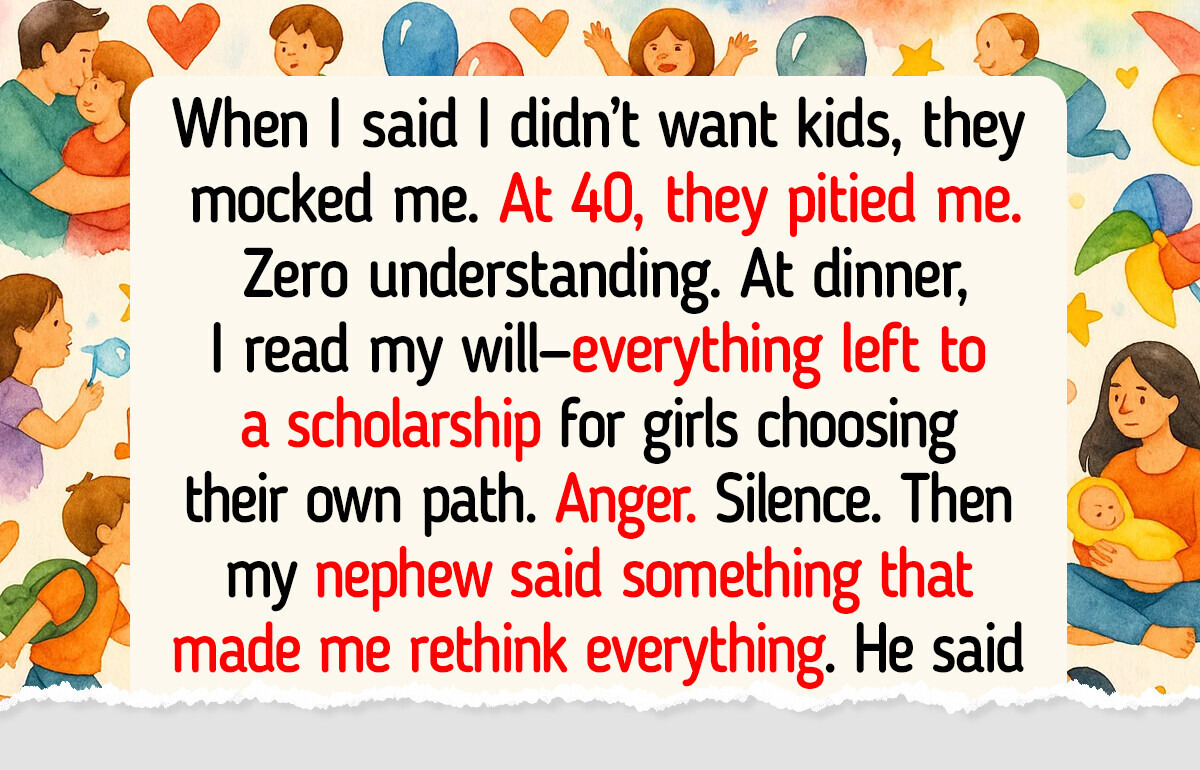
There are choices we make, and then there are choices the world insists on making for us. Few carry more judgment than the decision not to have children. Behind every polite smile or teasing comment, there’s often a deeper hurt—a sense of not fitting into the life others imagined.
One of our readers sent us a story about the night she stopped apologizing for her decision, and how a single sentence from the youngest person in the room changed everything.
The letter with her own words:
Hi dear Bright Side team!
When I told my family I didn’t want children, I was twenty-seven and idealistic. They laughed, called it a phase, said I’d “change my mind once the right man came along.”
When I turned thirty-five, they stopped teasing and started pitying. At forty, they called it sad.
Last year, after my father passed, I hosted the first family dinner since his funeral. It felt like time to say something that had been sitting in my chest for years. I’d brought envelopes for everyone — my sisters, my brother, my nieces and nephews, even my mother — copies of my will.
They thought I was being morbid.
My brother joked, “Planning your dramatic exit already?”
I just said, “Something like that.”
When I announced it, the laughter stopped.
I’d left my entire estate — savings, house, everything — not to my nieces and nephews, but to a new foundation I’d started: a scholarship fund for young women who choose a different path.
For girls who say no to expectations and yes to themselves.
The silence was sharp enough to cut through the tablecloth.
My sister whispered, “So we mean nothing to you?”
My mother said, “You’d rather give it to strangers than your own blood?”
And I said, “Not strangers — just women who remind me of the person I needed when I was their age.”
They argued for a while — words like selfish, cold, feminist nonsense. I let them.
Before they left, my nephew hugged me and said, “If I ever have a daughter, I hope she meets someone like you.”
That night, I sat in the quiet kitchen alone. And for the first time, I realized something: the only person who wasn’t fighting for my money was my nephew.
Now I feel like he deserves to be written in this will.
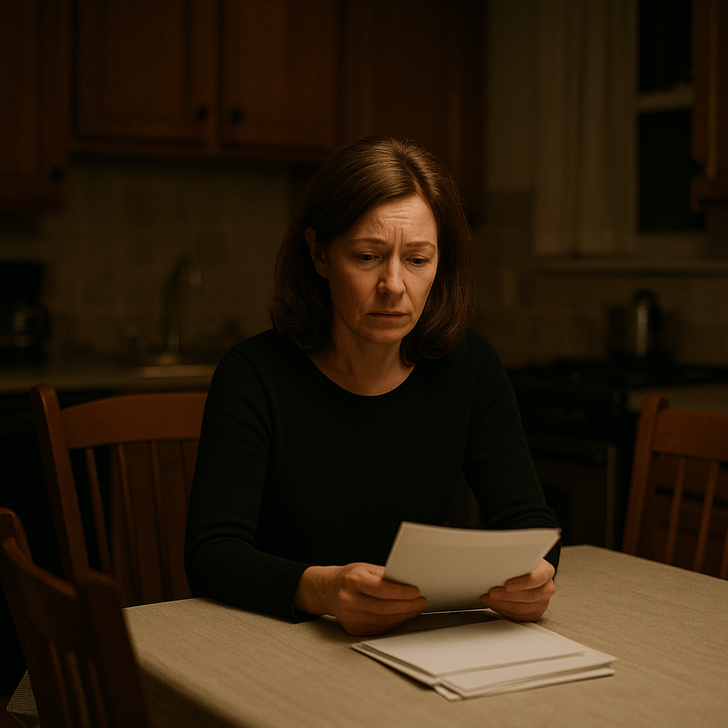
We’re grateful to our reader for opening their heart and sharing a story that many experience, but few feel brave enough to say aloud. Thank you for letting us tell it.
Why Child-Free People Should Still Think About Estate Planning.
Many people without children assume they don’t need to think about estate planning or Inheritance Tax. In reality, the opposite is true. Without a clear plan, a significant part of your estate could be lost to taxation or end up going to relatives you never intended to inherit anything.
If you want to decide exactly what happens to your assets after you’re gone, there are several ways to make sure your wishes are carried out. Here’s how you can do it, and how financial planners typically assist.

Why should leave anything to the people that acted like she meant nothing when she's alive. I don't blame her. Not everyone has a loving , caring family and for those that don't it has to hurt no matter how long its been. I know how that feels. At holidays and birthday it's just another day. It's hard to admit they don't care.
Leaving Money to Charity
For people who don’t have children or a spouse, leaving part of their estate to charity is often an important priority. Beyond supporting a meaningful cause, charitable giving can also reduce the taxes owed by your estate, depending on local laws.
Making donations during your lifetime can bring additional benefits:
Gifts made to registered charities usually fall outside your taxable estate.
They can lower the overall size of your estate, potentially reducing future tax obligations.
Depending on your region, the charity may also be able to claim an additional portion of the donation through local tax-relief programs.
In some places, donors themselves can receive tax relief on eligible contributions.
Planning for Future Care
Whether or not you have children, planning for long-term care is essential. Many people assume that care in later life will be fully covered by the government, but this often isn’t the case. Eligibility for financial support varies widely and depends on local regulations, personal circumstances, and assessments of income and assets.
Care can be costly, and the amount you’re expected to contribute depends on local rules and the level of support you qualify for. This is why future care needs must be considered in any long-term financial plan. Before making large gifts or major financial decisions, a financial planner can help estimate potential care costs and ensure you won’t place yourself at risk later on.
Comments
Sort of a bitter old hag aren't we? We are gathered here today so I can tell you I am better than all of you, nanananana....And like you would have any control over the foundation when you are dead. Admin will certainly enjoy your money.💲💲
You can do whatever you want with your money, it's yours.
Related Reads
I Refuse to Forgive My Parents After They Took My Inheritance for Being Childless
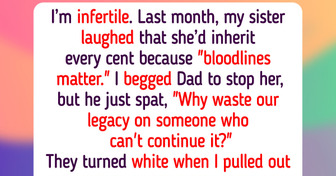
I Refuse to Adopt My Dying SIL’s Baby—Her Last Words Left Me Frozen
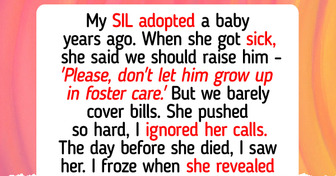
I Refused to Let My DIL Walk All Over Me in My Own House—Then She Went Too Far
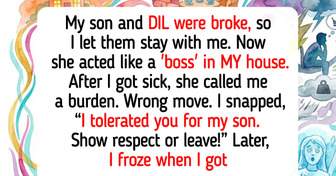
10 Teachers Who Learned Life Lessons From Their Remarkable Students
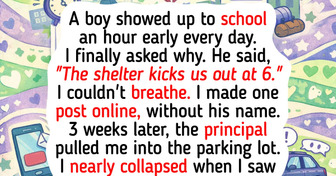
15 Stories That Prove Kindness Is a Boomerang That Returns When You Need It Most

15 Times Someone Showed Kindness Without Saying Anything
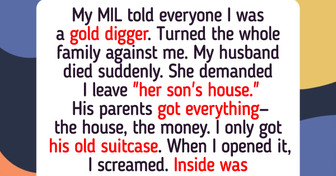
12 Small Acts of Kindness That Quietly Changed Lives
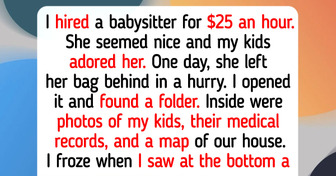
15 Stories That Prove Some People Live in a World With Totally Different Logic

I Gave My MIL a Simple Gift—But My Family Demanded I “Choose a Side”

My Parents Refused to Fund My Education, So I Turned the Tables on Them

20 Times Quiet Kindness Defeated the Dark Side of People

14 Quite Acts of Kindness That Changed Someone’s Life Forever
